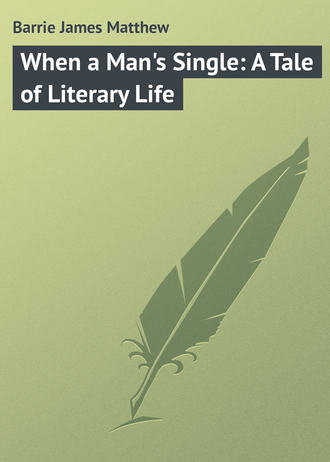 полная версия
полная версияWhen a Man's Single: A Tale of Literary Life
'Are you there, Abinger?' some one called out. 'I have something very extraordinary to tell you.'
Dick looked at his father, and hesitated. 'It is Angus,' he said.
'Let him in,' said the colonel.
CHAPTER XVI
THE BARBER OF ROTTEN ROW
Rob started when he saw Mary's father.
'We have met before, Mr. Angus,' said the colonel courteously.
'Yes,' answered Rob, without a tremor; 'at Dome Castle, was it not?'
This was the Angus who had once been unable to salute anybody without wondering what on earth he ought to say next. This was the colonel whose hand had gaped five minutes before for Rob's throat. The frown on the face of Mary's father was only a protest against her lover's improved appearance. Rob was no longer the hobbledehoy of last Christmas. He was rather particular about the cut of his coat. He had forgotten that he was not a colonel's social equal. In short, when he entered a room now he knew what to do with his hat. Their host saw the two men measuring each other. Dick never smiled, but sometimes his mouth twitched, as now.
'You had something special to tell me, had you not?' he asked Rob.
'Well,' Rob replied, with hesitation, 'I have something for you in my rooms.'
'Suppose my father,' began Dick, meaning to invite the colonel upstairs, but pausing as he saw Rob's brows contract. The colonel saw too, and resented it. No man likes to be left on the outskirts of a secret.
'Run up yourself, Abinger,' Rob said, seating himself near Mary's father; 'and, stop, here are my keys. I locked it in.'
'Why,' asked Dick, while his father also looked up, 'have you some savage animal up there?'
'No,' Rob said, 'it is very tame.'
Dick climbed the stair, after casting a quizzical look behind him, which meant that he wondered how long the colonel and Rob would last in a small room together. He unlocked the door of Rob's chambers more quickly than he opened it, for he had no notion of what might be caged up inside, and as soon as he had entered he stopped, amazed. All men of course are amazed once in their lives – when they can get a girl to look at them. This was Dick's second time.
It was the hour of the evening when another ten minutes can be stolen from the day by a readjustment of one's window curtains. Rob's blind, however, had given way in the cords, and instead of being pulled up was twisted into two triangles. Just sufficient light straggled through the window to let Dick see the man who was standing on the hearthrug looking sullenly at his boots. There was a smell of oil in the room.
Dowton!' Dick exclaimed; 'what masquerade is this?'
The other put up his elbow as if to ward off a blow, and then Dick opened the eyes of anger.
'Oh,' he said, 'it is you, is it?'
They stood looking at each other in silence.
'Just stand there, my fine fellow,' Dick said, 'until I light the gas. I must have a better look at you.'
The stranger turned longing eyes on the door as the light struck him.
'Not a single step in that direction,' said Dick, 'unless you want to go over the banisters.'
Abinger came closer to the man who was Sir Clement Dowton's double, and looked him over. He wore a white linen jacket, and an apron to match, and it would have been less easy to mistake him for a baronet aping the barber than it had been for the barber to ape the baronet.
'Your name?' asked Dick.
'Josephs,' the other mumbled.
'You are a barber, I presume?'
'I follow the profession of hair-dressing,' replied Josephs, with his first show of spirit.
Had Dick not possessed an inscrutable face, Josephs would have known that his inquisitor was suffering from a sense of the ludicrous. Dick had just remembered that his father was downstairs.
'Well, Josephs, I shall have to hand you over to the police.'
'I think not,' said Josephs, in his gentlemanly voice.
'Why not?' asked Dick.
'Because then it would all come out.'
'What would all come out?'
'The way your father was deceived. The society papers would make a great deal of it, and he would not like that.'
Dick groaned, though the other did not hear him.
'You read the society journals, Josephs?'
'Rather!' said Josephs.
'Perhaps you write for them?'
Josephs did not say.
'Well, how were you brought here?' Dick asked.
'Your friend,' said Josephs sulkily, 'came into our place of business in Southampton Row half an hour ago, and saw me. He insisted on bringing me here at once in a cab. I wanted to put on a black coat, but he would not hear of it.'
'Ah, then, I suppose you gave Mr. Angus the full confession of your roguery as you came along?'
'He would not let me speak,' said Josephs. 'He said it was no affair of his.'
'No? Then you will be so good as to favour me with the pretty story.'
Dick lit a cigar and seated himself. The sham baronet looked undecidedly at a chair.
'Certainly not,' said Dick; 'you can stand.'
Josephs told his tale demurely, occasionally with a gleam of humour, and sometimes with a sigh. His ambition to be a gentleman, but with no desire to know the way, had come to him one day in his youth when another gentleman flung a sixpence at him. In a moment Josephs saw what it was to belong to the upper circles. He hurried to a street corner to get his boots blacked, tossed the menial the sixpence, telling him to keep the change, and returned home in an ecstasy, penniless, but with an object in life. That object was to do it again.
At the age of eighteen Josephs slaved merrily during the week, but had never any money by Monday morning. He was a gentleman every Saturday evening. Then he lived; for the remainder of the week he was a barber. One of his delights at this period was to have his hair cut at Truefitt's and complain that it was badly done. Having reproved his attendant in a gentlemanly way, he tipped him handsomely and retired in a glory. It was about this time that he joined a Conservative association.
Soon afterwards Josephs was to be seen in Rotten Row, in elegant apparel, hanging over the railing. He bowed and raised his hat to the ladies who took his fancy, and, though they did not respond, glowed with the sensation of being practically a man of fashion. Then he returned to the shop.
The years glided by, and Josephs discovered that he was perfectly content to remain a hairdresser if he could be a gentleman now and again. Having supped once in a fashionable restaurant, he was satisfied for a fortnight or so with a sausage and onions at home. Then the craving came back. He saved up for two months on one occasion, and then took Saturday to Monday at Cookham, where he passed as Henry K. Talbot Devereux. He was known to the waiters and boatmen there as the gentleman who had quite a pleasure in tossing them half-crowns, and for a month afterwards he had sausage without onions. So far this holiday had been the memory of his life. He studied the manners and language of the gentlemen who came to the shop in which he was employed, and began to dream of a big thing annually. He had learnt long ago that he was remarkably good-looking.
For a whole year Josephs abstained from being a gentleman except in the smallest way, for he was burning to have a handle to his name, and feared that it could not be done at less than twenty pounds. His week's holiday came, and found Josephs not ready for it. He had only twelve pounds. With a self-denial that was magnificent he crushed his aspirations, took only two days of delight at Brighton, and continued to save up for the title. Next summer saw him at the Anglers' Retreat, near Dome Castle. 'Sir Clement Dowton' was the name on his Gladstone bag. A dozen times a day he looked at it till it frightened him, and then he tore the label off. Having done so, he put on a fresh one.
Josephs had selected his baronetcy with due care. Years previously he had been told that he looked like the twin-brother of Sir Clement Dowton, and on inquiry he had learned that the baronet was not in England. As for the Anglers' Retreat, he went there because he had heard that it was frequented by persons in the rank of life to which it was his intention to belong for the next week. He had never heard of Colonel Abinger until they met. The rest is known. Josephs dwelt on his residence at Dome Castle with his eyes shut, like a street-arab lingering lovingly over the grating of a bakery.
'Well, you are a very admirable rogue,' Dick said, when Josephs had brought his story to an end, 'and, though I shall never be proud again, your fluency excuses our blindness. Where did you pick it up?' The barber glowed with gratification.
'It came naturally to me,' he answered. 'I was intended for a gentleman. I dare say, now, I am about the only case on record of a man who took to pickles and French sauces the first time he tried them. Mushrooms were not an acquired taste with me, nor black coffee, nor caviare, nor liqueurs, and I enjoy celery with my cheese. What I liked best of all was the little round glasses you dip your fingers into when the dinner is finished. I dream of them still.'
'You are burst up for the present, Josephs, I presume?'
'Yes, but I shall be able to do something in a small way next Christmas. I should like to put it off till summer, but I can't.'
'There must be no more donning the name of Dowton,' said Dick, trying to be stern.
'I suppose I shall have to give that up,' the barber said with a sigh. 'I had to bolt, you see, last time, before I meant to go.'
'Ah, you have not told me yet the why and wherefore of those sudden disappearances. Excuse my saying so, Josephs, but they were scarcely gentlemanly.'
'I know it,' said Josephs sadly, 'but however carefully one plans a thing, it may take a wrong turning. The first time I was at the castle I meant to leave in a carriage and pair, waving my handkerchief, but it could not be done at the money.'
'The colonel would have sent you to Silchester in his own trap.'
'Ah, I wanted a brougham. You see I had been a little extravagant at the inn, and I could not summon up courage to leave the castle without tipping the servants all round.'
'So you waited till you were penniless, and then stole away?'
'Not quite penniless,' said Josephs; 'I had three pounds left, but – '
He hesitated.
'You see,' he blurted out, blushing at last, 'my old mother is dependent on me, and I kept the three pounds for her.'
Dick took his cigar from his mouth.
'I am sorry to hear this, Josephs,' he said, 'because I meant to box your ears presently, and I don't know that I can do it now. How about the sudden termination to the visit you honoured the colonel with last Christmas?'
'I had to go,' said Josephs, 'because I read that Sir Clement Dowton had returned to England. Besides, I was due at the shop.'
'But you had an elegant time while your money held out?'
Josephs wiped a smile from his face.
'It was grand,' he said. 'I shall never know such days again.'
'I hope not, Josephs. Was there no streak of cloud in those halcyon days?'
The barber sighed heavily.
'Ay, there was,' he said, 'hair oil.'
'Explain yourself, my gentle hairdresser.'
'Gentlemen,' said Josephs, 'don't use hair oil. I can't live without it. That is my only stumbling-block to being a gentleman.'
He put his fingers through his hair, and again Dick sniffed the odour of oil.
'I had several bottles of it with me,' Josephs continued, 'but I dared not use it.'
'This is interesting,' said Dick. 'I should like to know now, from you who have tried both professions, whether you prefer the gentleman to the barber.'
'I do and I don't,' answered Josephs. 'Hair-dressing suits me best as a business, but gentility for pleasure. A fortnight of the gentleman sets me up for the year. I should not like to be a gentleman all the year round.'
'The hair oil is an insurmountable obstacle.'
'Yes,' said the barber; 'besides, to be a gentleman is rather hard work.'
'I dare say it is,' said Dick, 'when you take a short cut to it. Well, I presume this interview is at an end. You may go.'
He jerked his foot in the direction of the door, but Josephs hesitated.
'Colonel Abinger well?' asked the barber.
'The door, Josephs,' replied Dick.
'And Miss Abinger?'
Dick gave the barber a look that hurried him out of the room and down the stairs. Abinger's mouth twitched every time he took the cigar out of it, until he started to his feet.
'I have forgotten that Angus and my father are together,' he murmured. 'I wonder,' he asked himself, as he returned to his own chambers, 'how the colonel will take this? Must he be told? I think so.'
Colonel Abinger was told, as soon as Rob had left, and it added so much fuel to his passion that it put the fire out.
'If the story gets abroad,' he said, with a shudder, 'I shall never hold up my head again.'
'It is a safe secret,' Dick answered; 'the fellow would not dare to speak of it anywhere. He knows what that would mean for himself.'
'Angus knows of it. Was it like the chivalrous soul you make him to flout this matter before us?'
'You are hard up for an argument against Angus, father. I made him promise to let me know if he ever came on the track of the impostor, and you saw how anxious he was to keep the discovery from you. He asked me at the door when he was going out not to mention it to either you or Mary.'
'Confound him,' cried the colonel testily; 'but he is right about Mary; we need not speak of it to her. She never liked the fellow.'
'That was fortunate,' said Dick, 'but you did, father. You thought that Josephs was a gentleman, and you say that Angus is not. Perhaps you have made a mistake in both cases.'
'I say nothing against Angus,' replied the colonel, 'except that I don't want him to marry my daughter.'
'Oh, you and he got on well together, then?'
'He can talk. The man has improved.'
'You did not talk about Mary?' asked Dick.
'We never mentioned her; how could I, when he supposes her engaged to Dowton? I shall talk about him to her, though.'
Two days afterwards Dick asked his father if he had talked to Mary about Angus yet.
'No, Richard,' the old man admitted feebly, 'I have not. The fact is that she is looking so proud and stately just now, that I feel nervous about broaching the subject.'
'That is exactly how I feel,' said Dick, 'but Nell told me to-day that, despite her hauteur before us, Mary is wearing her heart away.'
The colonel's fingers beat restlessly on the mantelpiece.
'I'm afraid she does care for Angus,' he said.
'As much as he cares for her, I believe,' replied Dick. 'Just think,' he added bitterly, 'that these two people love each other for the best that is in them, one of the rarest things in life, and are nevertheless to be kept apart. Look here.'
Dick drew aside his blind, and pointed to a light cast on the opposite wall from a higher window.
'That is Angus's light,' he said. 'On such a night as this, when he is not wanted at the Wire, you will see that light blazing into the morning. Watch that moving shadow; it is the reflection of his arm as he sits there writing, writing, writing with nothing to write for, and only despair to face him when he stops. Is it not too bad?'
'They will forget each other in time,' said the colonel. 'Let Dowton have another chance. He is to be at the Lodge.'
'But if they don't forget each other; if Dowton fails again, and Mary continues to eat her heart in silence, what then?'
'We shall see.'
'Look here, father. I cannot play this pitiful part before Angus for ever. Let us make a bargain. Dowton gets a second chance; if he does not succeed, it is Angus's turn. Do you promise me so much?'
'I cannot say,' replied the colonel thoughtfully. 'It may come to that.'
Rob was as late in retiring to rest that night as Dick had predicted, but he wrote less than usual. He had something to think of as he paced his room, for, unlike her father and brother, he knew that when Mary was a romantic schoolgirl she had dressed the sham baronet, as a child may dress her doll, in the virtues of a hero. He shuddered to think of her humiliation should she ever hear the true story of Josephs – as she never did. Yet many a lady of high degree has given her heart to a baronet who was better fitted to be a barber.
CHAPTER XVII
ROB PULLS HIMSELF TOGETHER
In a London fog the street-lamps are up and about, running maliciously at pedestrians. He is in love or writing a book who is struck by one without remonstrating. One night that autumn a fog crept through London a month before it was due, and Rob met a lamp-post the following afternoon on his way home from the Wire office. He passed on without a word, though he was not writing a book. Something had happened that day, and, but for Mary Abinger, Rob would have been wishing that his mother could see him now.
The editor of the Wire had called him into a private room, in which many a young gentleman, who only wanted a chance to put the world to rights, has quaked, hat in hand, before now. It is the dusty sanctum from which Mr. Rowbotham wearily distributes glory or consternation, sometimes with niggardly hand, and occasionally like an African explorer scattering largess among the natives. Mr. Rowbotham might be even a greater editor than he is if he was sure that it is quite the proper thing for so distinguished a man as himself to believe in anything, and some people think that his politics are to explain away to-day the position he took up yesterday. He seldom writes himself, and, while directing the line to be adopted by his staff, he smokes a cigar which he likes to probe with their pens. He is pale and thin, and has roving eyes, got from always being on the alert against aspirants.
All the chairs in the editorial room, except Mr. Rowbotham's own, had been converted, like the mantelpiece, into temporary bookcases. Rob tumbled the books off one (your Inquiry into the State of Ireland was among them, gentle reader) much as a coal-heaver topples his load into a cellar, or like a housewife emptying her apron.
'You suit me very well, Angus,' the editor said. 'You have no lurking desire to write a book, have you?'
'No,' Rob answered; 'since I joined the Press that ambition seems to have gone from me.'
'Quite so,' said Mr. Rowbotham, his tone implying that Rob now left the court without a stain upon his character. The editor's cigar went out, and he made a spill of a page from Sonnets of the Woods, which had just come in for review.
'As you know,' the editor continued, 'I have been looking about me for a leader-writer for the last year. You have a way of keeping your head that I like, and your style is not so villainously bad. Are you prepared to join us?'
'I should think so,' said Rob.
'Very well. You will start with £800 a year. Ricketts, as you may have heard, has half as much again as that, but he has been with us some time.'
'All right,' said Rob calmly, though his chest was swelling. He used to receive an order for a sack of shavings in the same tone.
'You expected this, I dare say?' asked the editor.
'Scarcely,' said Rob. 'I thought you would offer the appointment to Marriott; he is a much cleverer man than I am.'
'Yes,' assented Mr. Rowbotham, more readily than Rob thought necessary. 'I have had Marriott in my eye for some time, but I rather think Marriott is a genius, and so he would not do for us.'
'You never had that suspicion of me?' asked Rob, a little blankly.
'Never,' said the editor frankly. 'I saw from the first that you were a man to be trusted. Moderate Radicalism is our policy, and not even Ricketts can advocate moderation so vehemently as you do. You fight for it with a flail. By the way, you are Scotch, I think?'
'Yes,' said Rob.
'I only asked,' the editor explained, 'because of the shall and the will difficulty. Have you got over that yet?'
'No,' Rob said sadly, 'and never will.'
'I shall warn the proof-readers to be on the alert,' Mr. Rowbotham said, laughing, though Rob did not see what at. 'Dine with me at the Garrick on Wednesday week, will you?'
Rob nodded, and was retiring, when the editor called after him —
'You are not a married man, Angus?'
'No,' said Rob, with a sickly smile.
'Ah, you should marry,' recommended Mr. Rowbotham, who is a bachelor. 'You would be worth another two hundred a year to us then. I wish I could find the time to do it myself.'
Rob left the office a made man, but looking as if it all had happened some time ago. There were men shivering in Fleet Street as he passed down it who had come to London on the same day as himself, every one with a tragic story to tell now, and some already seeking the double death that is called drowning care. Shadows of university graduates passed him in the fog who would have been glad to carry his bag. That night a sandwich-board man, who had once had a thousand a year, crept into the Thames. Yet Rob bored his way home, feeling that it was all in vain.
He stopped at Abinger's door to tell him what had happened, but the chambers were locked. More like a man who had lost £800 a year than one who had just been offered it, he mounted to his own rooms, hardly noticing that the door was now ajar. The blackness of night was in the sitting-room, and a smell of burning leather.
'Another pair of slippers gone,' said a voice from the fireplace. It was Dick, and if he had not jumped out of one of the slippers he would have been on fire himself. Long experience had told him the exact moment to jump.
'I tried your door,' Rob said. 'I have news for you.'
'Well,' said Dick, 'I forced my way in here because I have something to tell you, and resolved not to miss you. Who speaks first? My news is bad – at least for me.'
'Mine is good,' said Rob; 'we had better finish up with it.'
'Ah,' Dick replied, 'but when you hear mine you may not care to tell me yours.'
Dick spoke first, however, and ever afterwards was glad that he had done so.
'Look here, Angus,' he said bluntly, 'I don't know that Mary is engaged to Dowton.'
Rob stood up and sat down again.
'Nothing is to be gained by talking in that way,' he said shortly. 'She was engaged to him six weeks ago.'
'No,' said Dick, 'she was not, though for all I know she may be now.'
Then Dick told his tale under the fire of Rob's eyes. When it was ended Rob rose from his chair, and stared silently for several minutes at a vase on the mantelpiece. Dick continued talking, but Rob did not hear a word.
'I can't sit here, Abinger,' he said; 'there is not room to think. I shall be back presently.'
He was gone into the fog the next moment. 'At it again,' muttered the porter, as Rob swung past and was lost ten paces off. He was back in an hour, walking more slowly.
'When the colonel writes to you,' he said, as he walked into his room, 'does he make any mention of Dowton?'
'He never writes,' Dick answered; 'he only telegraphs me now and again, when a messenger from the Lodge happens to be in Thrums.'
'Miss Abinger writes?'
'Yes. I know from her that Dowton is still there, but that is all.'
'He would not have remained so long,' said Rob, 'unless – unless – '
'I don't know,' Dick answered. 'You see it would all depend on Mary. She had a soft heart for Dowton the day she refused him, but I am not sure how she would take his reappearance on the scene again. If she resented it, I don't think the boldest baronet that breathes would venture to propose to Mary in her shell.'
'The colonel might press her?'
'Hardly, I think, to marry a man she does not care for. No, you do him an injustice. What my father would like to have is the power to compel her to care for Dowton. No doubt he would exercise that if it was his.'
'Miss Abinger says nothing – sends no messages – I mean, does she ever mention me when she writes?'
'Never a word,' said Dick. 'Don't look pale, man; it is a good sign. Women go by contraries, they say. Besides, Mary is not like Mahomet. If the mountain won't go to her, she will never come to the mountain.'
Rob started, and looked at his hat.
'You can't walk to Glen Quharity Lodge to-night,' said Dick, following Rob's eyes.
'Do you mean that I should go at all?'









